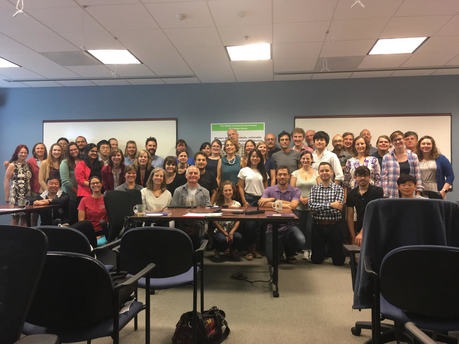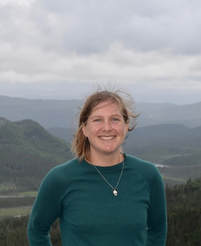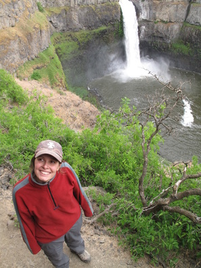 Written by Elizabeth Brandt. Elizabeth Brandt is a M.S. student in Dr. David Hawthorne’s lab studying the detoxification gene pathways of the honey bee. On an extremely wet Saturday in Annapolis, the UMD Entomology department gathered at the downtown offices of SESYNC for their annual Department Retreat. The retreat is designed for all members of the department to come together at the beginning of a new academic year to discuss the past year’s developments and accomplishments, and to synthesize a strategic plan for the coming year. Part of the retreat’s agenda includes a series of short research talks given by graduate students, postdocs, and faculty. For the 2018 retreat, the department welcomed two new faculty members, Dr. Karin Burghardt and Dr. Anahí Espíndola. Each gave a short talk about their research interests.  Dr. Burghardt (pictured at right) is an ecologist who evaluates the effects of landscape management and manipulation of landscape features on trophic level interactions. She described two of her projects that exemplify these goals. The first was a large-scale tree diversity experiment, where large plots of land were assigned to growing monocultures (single tree species) or polycultures (mixed tree species) and assessing how species diversity correlates to insect herbivore abundance and diversity. Surprisingly, her data suggest that a diverse and increased population of insect herbivores did not have an effect on tree damage rates. Dr. Burghardt considered multiple potential explanations, including the effect of predation on the herbivores, as well as the possibility of tree microbiota (soil mycorrhizal fungi and leaf fungal endophytes) aiding the tree’s resilience and ability to compensate for the feeding damage. Dr. Burghardt’s interest in plants’ microbiota led to her second (proposed) project, which involves looking at plants’ rhizobial communities and determining whether diversifying these nitrogen-fixing bacteria in crop fields (a plant monoculture) has an effect on the crop’s resiliency. Preliminary data (unpublished) suggest that with increased rhizobial diversity, a monoculture has less insect herbivore damage in the face of drought conditions. Along with collaborators at the Smithsonian, she plans to study this further using soybeans, Maryland’s second largest grain crop.  Dr. Espíndola (pictured left) is an evolutionary ecologist who is interested in identifying the factors that have led to the evolution of interacting species, and the specific relationships that insects, especially pollinators, have with plants. In a broad sense, she is excited by how the beauty of life’s diversity came to be. The many factors involved in this process can include the geography and the abiotic conditions of the landscape in which organisms live, and the types of interactions they display, which can be studied using phylogeography and phylogenetics. In her previous work, Dr. Espíndola studied the specific relationship between lady’s purse plants (genus Calceolaria) and the bees that pollinate their flowers. These flowers are unique in that they produce oil instead of nectar, which oil collecting bees use to feed their offspring and line their nests. Both the bees and the flowers have specialized structures related to oil production and collection, making them a fascinating example of possible co-evolution at play. Dr. Espíndola also plans to use the features of the landscape to explore how it affects the way pollination interactions occur. By examining the ecological relationships occurring in a fragmented landscape such as the serpentine barrens spanning across Maryland and Pennsylvania, she can hypothesize on how the presence of long strips of landscape with more or less sparse vegetation affect communities of interacting species and their evolution. The University of Maryland Entomology department is extremely excited to welcome Drs. Burghardt and Espíndola! More information about the newest members of our faculty can be found at their websites: Dr. Karin Burghardt and Dr. Anahí Espíndola Comments are closed.
|
Categories
All
Archives
June 2024
|
Department of Entomology
University of Maryland
4112 Plant Sciences Building
College Park, MD 20742-4454
USA
Telephone: 301.405.3911
Fax: 301.314.9290
University of Maryland
4112 Plant Sciences Building
College Park, MD 20742-4454
USA
Telephone: 301.405.3911
Fax: 301.314.9290

 RSS Feed
RSS Feed




